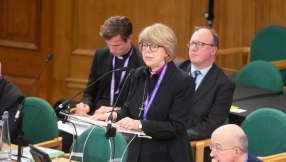
There was a period of time in the 1990s when it was popular for politicians to talk about 'family values'. The voting population was often surveyed to discover their relative ratings of political parties' support for these beliefs. But this concern seems less common in recent times. What happened?
"Family values" means different things to different people. For some, it refers to all social conservative values, such as: chastity, commitment, marriage, tradition, patriotism, and obviously the family itself. This is sometimes defined more by what social conservatives are against, though: pornography, divorce, drugs, radical feminism, same-sex marriage, for example. For others, it is simply supporting different kinds of families and encouraging what is necessary to help them thrive.
One obvious reason why British politicians piped down about "family values" was the embarrassment when those values were shown somewhat shallow, or non-existent, in the politicians themselves. For example, after Conservative Prime Minister John Major launched his "back to basics" campaign in 1993, it wasn't long before the tabloid newspapers uncovered a series of grubby scandals that led to many resignations.
There were numerous "cash for questions" affairs, such as that of Neil Hamilton. There were also many sex scandals of a kind that might not be considered as scandalous in today's more permissive society: fathering children to women who were not their wives, as environment minister Tim Yeo admitted, having affairs like Lord Caithness, or the closeted homosexuality of Michael Brown, a minister and MP. At the time such behaviour was seen as hypocritical, and its exposure led to a resignation. Of course, in later years it was also discovered that Major himself had conducted an extra-marital affair prior to his premiership.
A return to family values?
Despite this ignoble history, could family values be making a comeback? Current Prime Minister Rishi Sunak mentioned family 14 times in his New Year speech this year, according to the i newspaper. "Family runs right through our vision of a better future," the PM said, according to the report. He stressed the need for "a society that truly values the family".
Of course in recent times the higher echelons of the Conservative Party have not been any more family-orientated. Former Prime Minister Boris Johnson has had several marriages and many adulterous affairs, and the photos of Matt Hancock's adulterous clinch in a lift in 2021 provoked public fury, more for his breaching of Covid rules than his infidelity.
However there are a few Tory MPs who seem to be more committed to the traditions of "family values" and who are starting to speak up. Miriam Cates, who is a Christian, has spoken positively of the traditional family and the protection of children on multiple occasions, and fellow social conservatives (and fellow Christians) Danny Kruger and Nick Fletcher too.
The rise of anti-family values
It is not just the hypocrisy of their colleagues that makes these discussions more difficult today, however. Many modern activists express their explicit desire to promote the opposite of the traditional family. Not limited to the promotion of same-sex relationships or even polygamous relationships, these new movements argue that the traditional family promotes inequality, among other things. There has also been a decline in marriage in British society, so fewer voters might be perceived to view it as important.
And while the PM has discussed the family, Harry Benson at the Marriage Foundation argues that politicians are less comfortable discussing marriage itself. "It's now a decade since any cabinet minister made a speech that included the importance of marriage," he wrote in a blog for the UK 2024 election. "This public silence is at odds with their private behaviour. Rishi Sunak and Sir Keir Starmer are both married, as are most of their respective cabinets. What do they know that we shouldn't know?"
Those who denigrate marriage or family while receiving their benefits themselves have been accused of having "luxury beliefs", a term coined by former foster child and now successful writer, Rob Henderson. It refers to beliefs that damage society, especially the poor, yet are promoted by the elite, who do the exact opposite. "The original luxury belief is that family structure is unimportant, despite a vast body of research indicating that a stable two-parent home is one of the strongest factors for a child's wellbeing and future," Henderson wrote on his newsletter. "Among U.S. college graduates, only 25 percent think couples should be married before having kids.
"Their actions, though, contradict their luxury belief: the majority of American college graduates who have children are married. Affluent people are the most likely to promote the view that marriage is unimportant, despite their behaviour suggesting otherwise."
Is the American family valued?
'Family values' has had more success in the US, where it still seems to be valued. It became a core part of the presidential campaign at the 1992 Republican National Convention, where a "Family Values Night" featured Barbara Bush and Vice President Dan Quayle's wife, Marilyn. The focus was Hillary Clinton and their claims that she wanted to undermine the family. That campaign was unsuccessful, and the Clintons went on to win the White House, despite their somewhat questionable family values. Historically the American public say that they consider this very important in their choice of President. While it might not seem so, after the rise in support for Donald Trump, a man whose attitude towards women and marriage is certainly not aligned with what most people consider 'family values' - much of his support on the right was due to the perceived lesser values of Clinton and Joe Biden in comparison, especially on abortion.
US polls this year show that for voters on the right, family values are still considered important in the US. "Trump supporters (59%) are much more likely than Biden supporters (19%) to say that it is better if people prioritize marriage and children," concluded a recent poll from Pew Research. A similar trend occurs for beliefs on abortion, though younger Trump voters are more 'pro choice' than their older fellows.
The future of family values
It might seem that with a seemingly more liberal younger generation and their rejection of the social conservative beliefs that are usually associated with "family values", that the future looks bleak. However, there are a few signs that Gen Z is more traditional or conservative than its elders in the UK; and there is a recent shift in US society further towards family values.
Perhaps the pendulum is swinging? The UK's general election will undoubtedly lead to a shake up in party politics as the Conservative party flounders. This could lead to a return to family values – or a turn against them. There are small political parties that are more traditionally conservative waiting in the wings, such as the Social Democratic Party. Family values aren't quite finished – yet.
Heather Tomlinson is a freelance journalist. Find her at www.heathertomlinson.substack.com or on twitter @heathertomli













